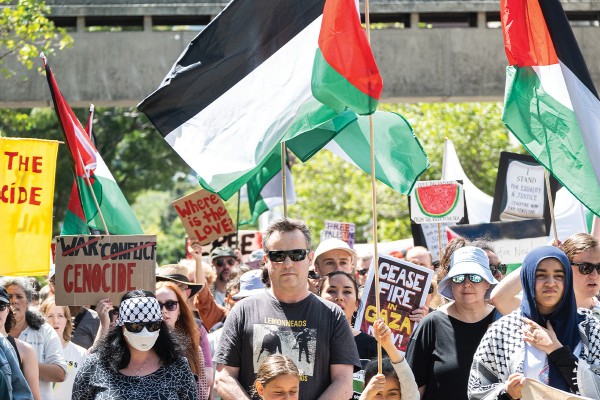We’re going to talk about Gaza. It would be a mistake to think that this is a decision Critic has taken lightly.
Editorship at Critic is constantly changing. Most editors only stay for one year, with former editor Fox breaking the mould by staying for two. And with each editor, the tone, content, and scope of the magazine changes — as you’ll no doubt notice. A dig through the archives will tell you that the shift goes far beyond small changes like how I’m less into earthquakes than Fox was.
Our scope has widened and narrowed with the changing environment and perspectives of editors: some editors have focused solely on Dunedin (sticking to landlords and reviews), while others have brought global issues before students (like that one editor who wouldn’t stop talking about George Bush).
At the end of the day, it all boils down to what is most important to students. Some days that is how to most effectively de-scabies your flat, or where to find the best fish and chips in town. Other times, it is hearing the perspectives of those in our community who are hurting and need our support, whether that hurt is caused locally or because of a violence happening on the other side of the globe.
Our poll showed us that 644 of you are at least interested in engaging with the issue. As long as you keep it relevant, we will cover it. And this won’t be the first time we’ve written about it, either. Critic has been talking about Gaza for years, with search results bringing up articles from 2022, 2021, 2014, 2012, 2011, 2006, and 2002.
For journalists (which some consider us to be), the principles of balance and objectivity are crucial, as well as openness and transparency. As a Critic reporter in 2011 wrote in her article ‘Their Land, Our Land’ that explored perspectives that existed on the conflict (itself a contested word among those who are adamant it's genocide): “Whose voice and what perspective a story is told from is always a dilemma in journalism, and the dilemma only heightens in the context of the world’s thorniest, most perplexing issue; the conflict between Israel and “Palestine” or the “Occupied Palestinian Territories” (which label is used all depends on the perspective.)”
Neither the Uni nor OUSA wish to speak on the issue out of fear it would make some students with connections to Israel feel unsafe, which we don’t want either. So we’ll be as precise as possible with our vocabulary to make sure you know that when we speak about Israel, we speak of the right-wing religious government run by Benjamin Netanyahu — the state that is currently committing violent atrocities against innocent civilians.
Just as many Kiwis would loathe for the actions and policies of our current government to be representative of personal positions, when we speak about Israel, we are not referring to its own citizens, many of whom oppose the actions of their government. And when we speak about Palestine, we speak about the people, not Hamas.
We won’t pretend to be experts. One Politics professor who we spoke to for the feature in this issue — someone who lived in the Middle East for a long time and was in Israel mere months before the Hamas attack in October last year — admitted that despite this he still doesn’t feel like he completely understands what is happening. But that doesn’t mean he isn’t trying, as we at Critic are, too.
As I said, we are not experts. It gets the most thorny when you dive into (as we’ve heard time and time again) the “long complicated history” of Israel and Palestine. But when it comes to the matter of the humans who are suffering beyond our comprehension, it is simple. While the world is caught up in politics, if you speak to the people with families who are living in constant fear, surrounded by death and destruction - whether that is in Palestine or in Israel - it is simply a matter of humanity.






